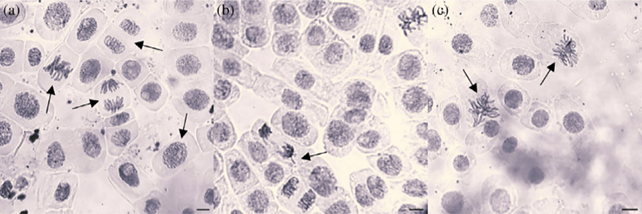[ad_1]
Our love for espresso means tens of millions of tons of spent espresso grounds going to waste each single yr. Scientists have been engaged on methods to utilize them, and we now have one other so as to add to the record: previous espresso grounds have been proven to soak up bentazone, a herbicide utilized in agriculture.
If the expertise may be developed, it will remedy two environmental issues in a single: espresso floor waste, and harm attributable to farming herbicides to wildlife and the encircling pure world.
A group from the Federal Technological College of Paraná (UTFPR) in Brazil discovered that when zinc chloride was used to activate the carbon in spent espresso grounds, this carbon confirmed a 70 p.c effectivity in eradicating bentazone – essentially the most generally used herbicide in agriculture.

The scientists ran exams utilizing bentazone dissolved in liquid, each earlier than and after the therapy with the activated carbon from the used espresso grounds, the way it affected onion root tissues referred to as meristems.
These tissues are factors from which vegetation develop, so a plant’s improvement is disrupted once they’re broken.
“Earlier than adsorption, the effluent triggered vital cytogenotoxicity to onion root meristems,” write the researchers of their printed paper. “After adsorption, the generated effluent not triggered toxicity to the take a look at system, and the outcomes obtained have been just like the management with distilled water.”
The Environmental Safety Company (EPA) within the US has already flagged up doubtlessly damaging ranges of bentazone in groundwater and consuming water. It is also identified to influence human well being by means of inhalation, ingestion, or absorption by means of the pores and skin.
As for previous espresso grounds, they’re unhealthy for the surroundings whether or not they’re dumped into water or despatched to landfill websites. Nonetheless, a few of the chemical reactions they set off have been proven to be helpful in decontamination processes.
These are solely preliminary outcomes, however they’re promising – they present that carbon from used espresso grounds is efficient in treating water polluted by bentazone. The subsequent steps will contain refining the processes right here and scaling them up.
“This makes this research of nice relevance within the industrial and environmental context as a result of there are well being and environmental issues with the uncontrolled use of those supplies,” write the researchers.
Whether or not it is enhancing the dietary worth of meals and even defending in opposition to dementia, scientists are discovering increasingly methods to repurpose previous espresso grounds – which makes us really feel barely higher about our espresso guzzling habits.
Because the group right here acknowledges, it is not absolutely clear how the absorption course of works, however the findings of the research ought to assist future analysis on this space too. There are a selection of potentialities for eradicating pesticide pollution from the surroundings, however there’s additionally nonetheless plenty of work to be finished.
“Presently, the contamination of groundwater and floor water is among the most urgent environmental issues – the largest problem of this century is to stop water air pollution,” write the researchers.
The analysis has been posted within the Journal of Chemical Expertise and Biotechnology.
[ad_2]
Supply hyperlink

